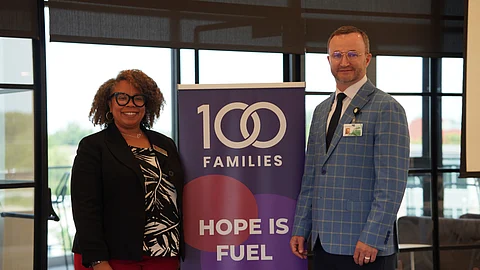
- Home
- Topic Areas
- Newsletter
- Podcast
- 100 Families Initiative
- About
- Connect
- Restore Hope

“When one person is healthy, that has an impact on the entire community,” shared Kenya Eddings, Executive Director of the Arkansas Minority Health Commission, setting the tone for a community meeting in Bentonville.
Hosted in partnership with the 100 Families Initiative, the event brought together local leaders, advocates, and neighbors to explore the connection between mental and physical health. Panelists Eddings and Zack Bird, CEO of Springwoods Behavioral Health, led a conversation on the challenges families face—and the collaborative solutions needed to support them.
Eddings began by sharing the wide-ranging services of the Arkansas Minority Health Commission, which has a presence in all 75 Arkansas counties. “We screen every day for blood sugar, blood pressure, cholesterol… even HIV, hepatitis C, and syphilis,” she said. From a fully-equipped mobile health unit to state-supported programs addressing chronic disease and food insecurity, Eddings emphasized the need to “stand in the gap” for communities without easy access to care.
One highlight of the Commission’s outreach efforts is its Southern Ain’t Fried Sundays program, a 21-day nutrition initiative that helps Arkansans make small, sustainable dietary changes without giving up traditional Southern favorites. “We know that heart disease is the number one cause of death for all Americans, especially here in Arkansas,” Eddings explained, “so we teach people how to modify what they eat—not eliminate it.”
She also emphasized the Commission’s outreach to children and families through the Can I Camp, a mobile summer program teaching social-emotional skills, yoga, physical health, and nutrition to kids ages 9 to 12.
Zack Bird, relatively new to his role at Springwoods Behavioral Health, spoke from a systems-level perspective about building quality, trust, and accessibility in behavioral care.
“My approach is definitely going to be from that perspective—making sure the care we provide is high quality,” he said.
Springwoods offers psychiatric emergency services for youth ages 12 and older, including detox services and residential stays up to 30 days.
“People can come directly to us,” Bird explained. “Sometimes people think they need to go to the ER, but if there’s a mental health crisis, we want to be the first call.”
Bird acknowledged persistent barriers, including stigma and misinformation: “I think people reach a point where things fester until they’re so bad they don’t know what to do. That’s the real challenge.”
Both panelists agreed: no single agency can meet every need. “We’re a small but mighty team,” Eddings said. “So partnerships are everything.” She highlighted collaborations with the Arkansas Prostate Cancer Foundation, the Arkansas Hunger Relief Alliance, and others to deliver nutrition education, free screenings, and in-home diagnostic kits. These alliances ensure that services are comprehensive and culturally responsive.
Bird echoed this sentiment: “The relationships we have with community organizations help us strengthen each other. If we know each other, we’re better able to serve clients together, not just individually.”
As the panel closed, the conversation turned toward solutions. Attendees discussed the need for Medicaid policy changes, school-based supports, presumptive eligibility for expecting mothers, and the importance of trauma-informed systems of care.
Bird offered a framework of care built around assessment, targeted treatment, and intentional discharge planning. Eddings added that simply showing up—and staying consistent—can be transformational. “We don’t expect folks to always come to us. We go to them. That matters.”
In a powerful moment, Eddings reminded the audience, “When families are healthy—physically, mentally, socially—there’s less pressure on the health care system, and a ripple effect of wellness across the whole community.”
Both Springwoods and the Minority Health Commission encouraged attendees to reach out for mobile services, referrals, screenings, and ongoing partnership.
To get involved, partner for services, or refer a family: Visit Springwoods Behavioral Health or call 479-973-6000 (open 24/7). Contact the Arkansas Minority Health Commission at 501-686-2720 or follow them on Facebook, Instagram, and Twitter.
Smart Justice is a magazine, podcast, and continuing news coverage from the nonprofit Restore Hope and covers the pursuit of better outcomes on justice system-related issues, such as child welfare, incarceration, and juvenile justice. Our coverage is solutions-oriented, focusing on the innovative ways in which communities are solving issues and the lessons that have been learned as a result of successes and challenges.
The podcast is available on all major podcasting platforms.
Subscribe to the Smart Justice newsletter.
